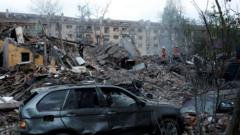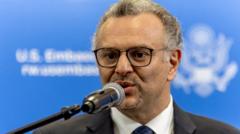In a heated exchange, President Trump urged Ukraine to accept a controversial peace proposal that favors Russia while President Zelensky firmly asserts Ukraine's claims on Crimea, signaling a continuing clash between U.S. diplomacy and Ukrainian sovereignty.
Trump Pressures Ukraine on Peace Proposal, Critiques Zelensky

Trump Pressures Ukraine on Peace Proposal, Critiques Zelensky
Former President Trump publicly rebukes Ukraine's President after rejection of a U.S.-backed peace plan aligning with Russian interests.
Article Text:
In a striking diplomatic encounter, former President Donald Trump criticized Ukrainian President Volodymyr Zelensky for rejecting a proposed peace agreement intended to resolve the ongoing war with Russia. Trump took to social media, stating, “He can have Peace or, he can fight for another three years before losing the whole Country." The proposal outlined by Vice President JD Vance suggests a dramatic shift in U.S. foreign policy, emphasizing a "freeze" on territorial lines from the three-year conflict, recognition of Russia's annexation of Crimea, and a commitment to prevent Ukraine from joining NATO.
This marked the first instance of a U.S. official publicly presenting a peace initiative that aligns with Russia's demands in such clear-cut terms. Vance further indicated that the U.S. might withdraw from negotiations if both parties do not accept the terms, placing notable pressure on Zelensky. Hours before Trump's statements, Zelensky firmly responded, affirming that Ukraine would categorically never accept the legality of Russia's occupation of Crimea, asserting, “There is nothing to talk about. This violates our Constitution. This is our territory, the territory of the people of Ukraine.”
Trump accused Zelensky of making “inflammatory” remarks and questioned Ukraine's actions regarding Crimea, stating, “If he wants Crimea, why didn’t they fight for it eleven years ago when it was handed over to Russia without a shot being fired?” He further claimed, “The statement made by Zelenskyy today will do nothing but prolong the ‘killing field,’ and nobody wants that!”
Currently, Russian forces occupy nearly 20 percent of Ukraine's land, and the proposed cessation of conflict would effectively compel Ukraine to relinquish significant territories to Russia. This continued tension highlights the complex interplay between U.S. diplomatic strategies and the enduring fight for Ukrainian sovereignty.
In a striking diplomatic encounter, former President Donald Trump criticized Ukrainian President Volodymyr Zelensky for rejecting a proposed peace agreement intended to resolve the ongoing war with Russia. Trump took to social media, stating, “He can have Peace or, he can fight for another three years before losing the whole Country." The proposal outlined by Vice President JD Vance suggests a dramatic shift in U.S. foreign policy, emphasizing a "freeze" on territorial lines from the three-year conflict, recognition of Russia's annexation of Crimea, and a commitment to prevent Ukraine from joining NATO.
This marked the first instance of a U.S. official publicly presenting a peace initiative that aligns with Russia's demands in such clear-cut terms. Vance further indicated that the U.S. might withdraw from negotiations if both parties do not accept the terms, placing notable pressure on Zelensky. Hours before Trump's statements, Zelensky firmly responded, affirming that Ukraine would categorically never accept the legality of Russia's occupation of Crimea, asserting, “There is nothing to talk about. This violates our Constitution. This is our territory, the territory of the people of Ukraine.”
Trump accused Zelensky of making “inflammatory” remarks and questioned Ukraine's actions regarding Crimea, stating, “If he wants Crimea, why didn’t they fight for it eleven years ago when it was handed over to Russia without a shot being fired?” He further claimed, “The statement made by Zelenskyy today will do nothing but prolong the ‘killing field,’ and nobody wants that!”
Currently, Russian forces occupy nearly 20 percent of Ukraine's land, and the proposed cessation of conflict would effectively compel Ukraine to relinquish significant territories to Russia. This continued tension highlights the complex interplay between U.S. diplomatic strategies and the enduring fight for Ukrainian sovereignty.




















